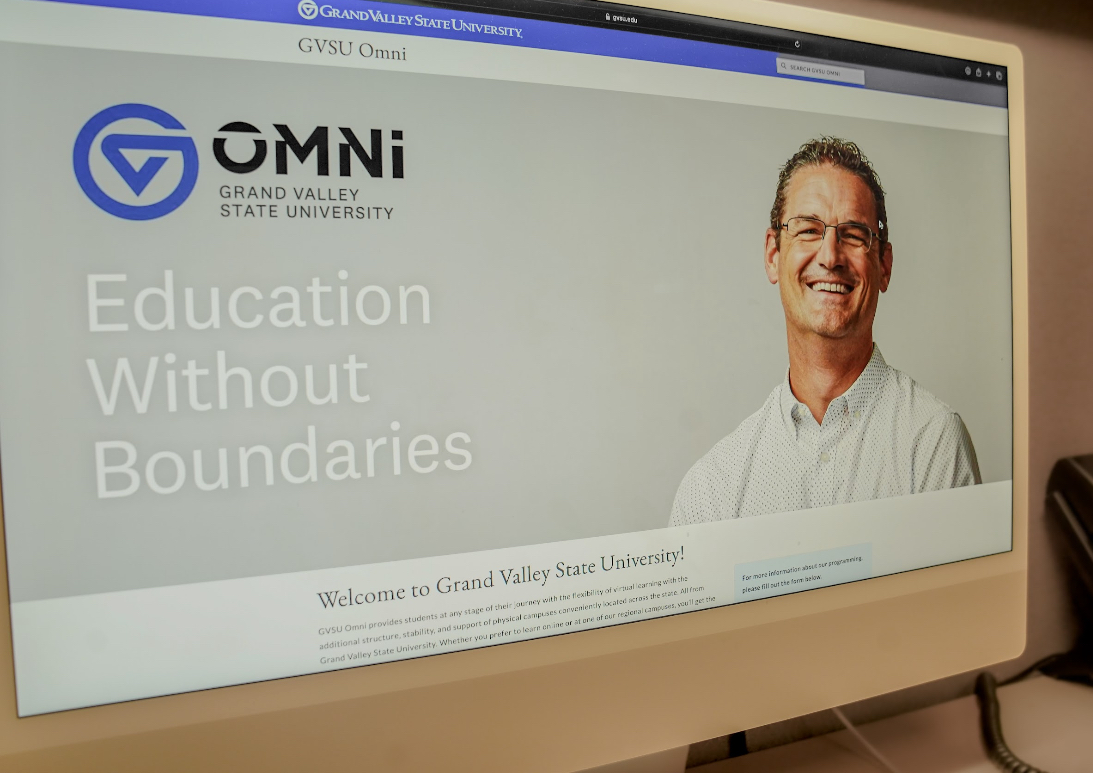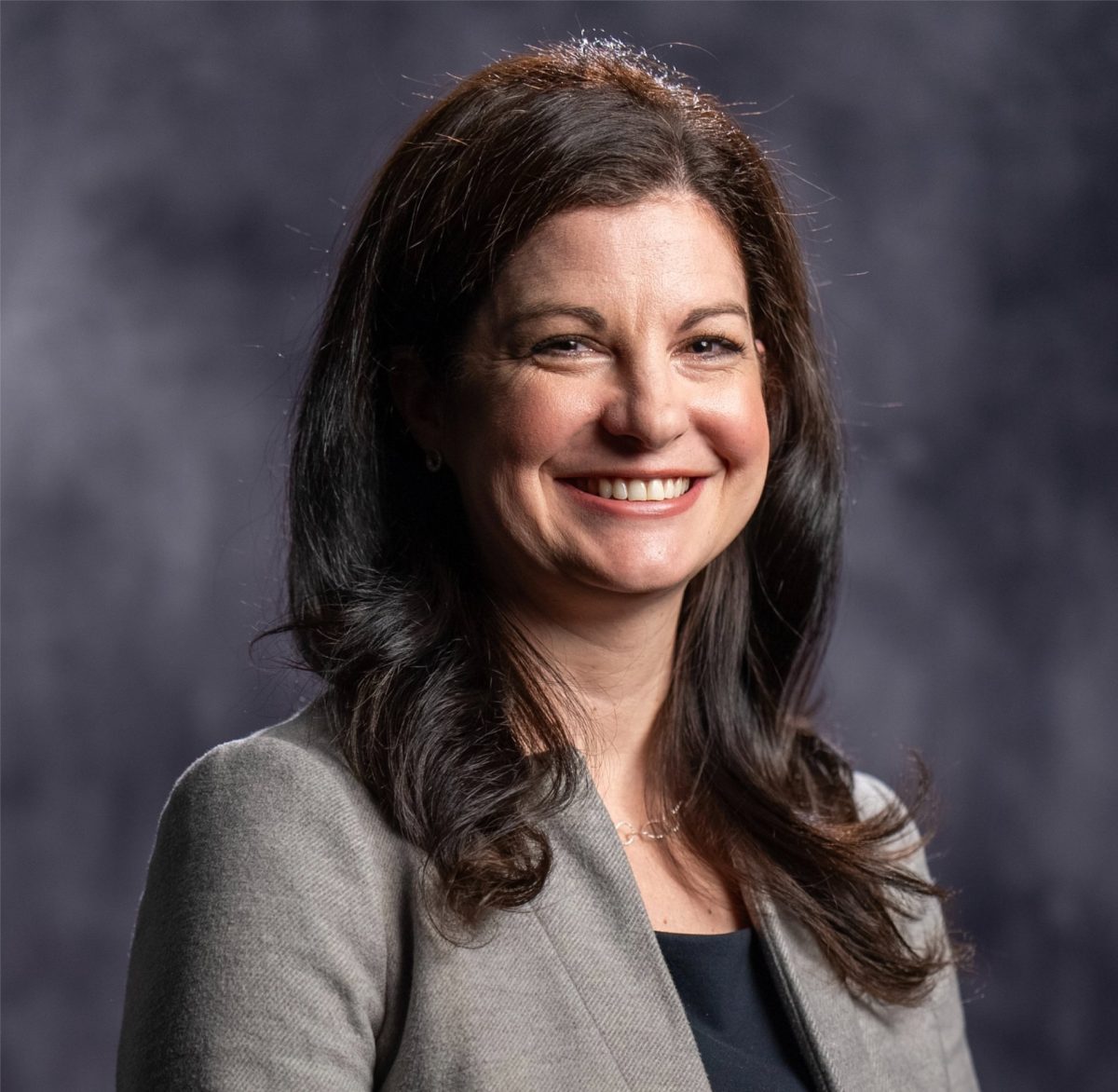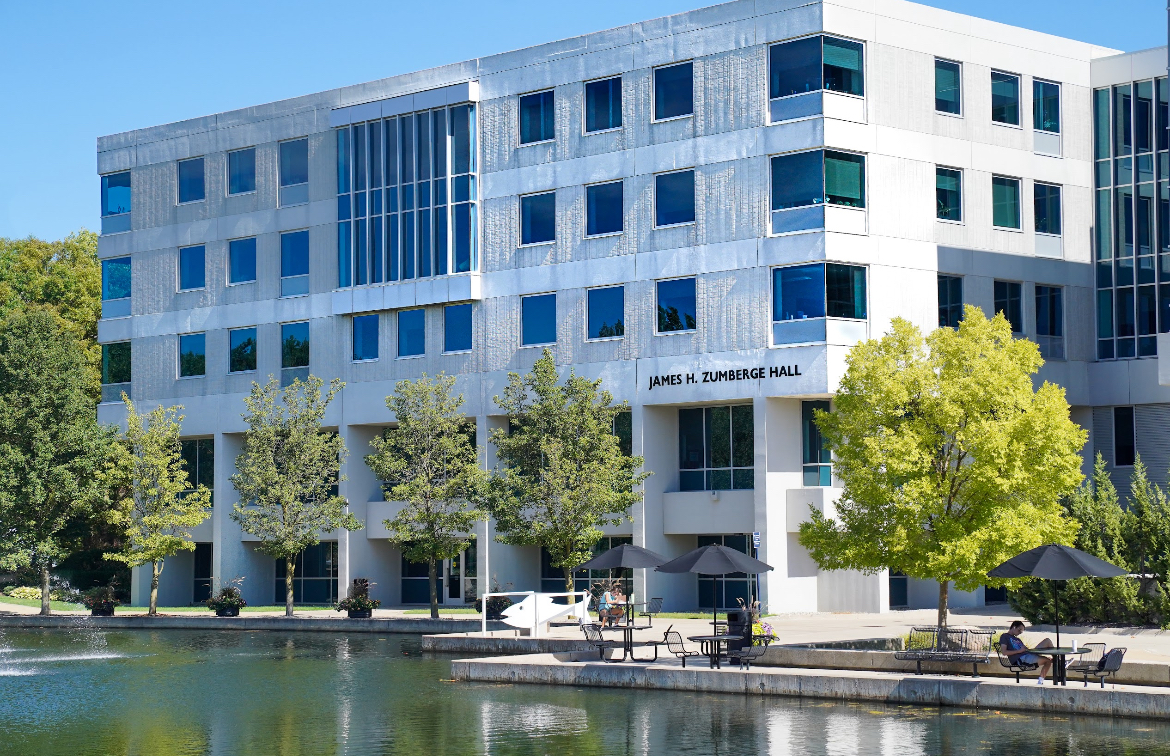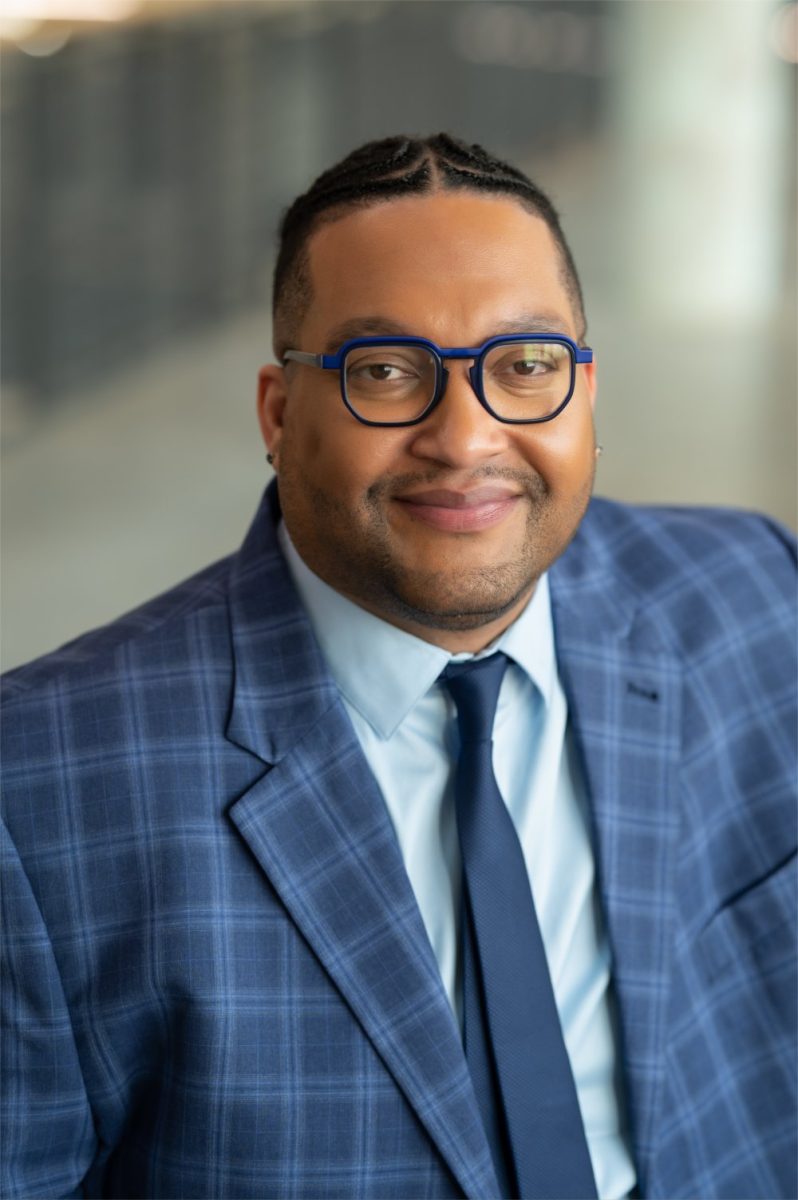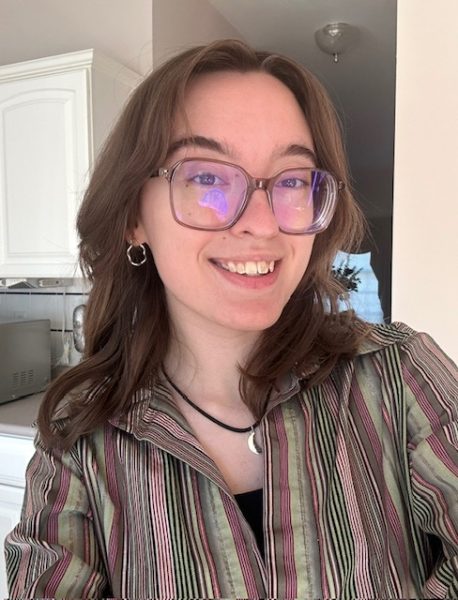Grand Valley State University administration and faculty leadership have formed task forces and advisory groups in an attempt to navigate faculty concerns and uncertainty surrounding Omni, the University’s online, adult learning program. Omni was officially launched by GVSU this academic year.
Omni, described as a flexible and accessible adult learning program, was announced at a Board of Trustees meeting on Feb. 23, 2024, and builds on prior online learning initiatives by the University. The program is offered in the form of hybrid courses throughout the state of Michigan, and is based in a partnership with five regional campuses and community colleges that will create a network for higher education. The initiative is being led by the Chief Executive of Omni, Kara Van Dam, previously the University’s vice provost for Graduate and Lifetime Learning.
According to Courtney Karasinski, the chair of the GVSU University Academic Senate (UAS), Van Dam met with the senate’s Executive Committee (ECS), and Philomena Mantella, president of GVSU, met with a small group of the UAS to listen to what some felt was a rapidly moving initiative with minimal faculty involvement. An Omni task force was also convened in May by the Senior Associate Vice President for Academic Affairs, Ed Aboufadel. The task force comprised of Omni staff and individuals from the Division of Academic Affairs.
“Although faculty did not create Omni, the Omni task force provided an opportunity for faculty to provide input into the implementation of Omni,” Karasinski said.
The task force created a Shared Expectations of Engagement document, which was shared with members of administration, including Mantella and the University’s former provost Fatma Mili. The document, along with a cover letter detailing recommendations, outlines aspects of the Omni initiative, ranging from the program’s hiring processes to course assessment guidelines. The Shared Expectations proposal, dated June 17, 2024, was obtained through a Freedom of Information Act (FOIA) request.
The proposal states that part of the tuition from Omni should be reinvested in the program’s participating colleges and programs. With University administration and Omni leadership expecting the GVSU student population to increase as a result of the initiative, the document also notes that relevant student services at the University will expand to support the student body.
“We appreciate the engagement in Omni of GVSU’s faculty members, including those who took part in an Omni task force,” Van Dam said. “This group shared dozens of ideas with us and we are in the process of implementing many of those.”
The task force’s cover letter included a recommendation to create an Omni advisory group. The group would comprise relevant faculty members, and would continue dialogue and discussion with Omni leadership and Academic Affairs.
In an memorandum procured through a FOIA request, which was sent from the University’s Acting Provost and Vice President for Academic Affairs, Jennifer Drake, to Karasinski, Drake wrote that the advisory group would be implemented.
The Omni Collaborative Advisory Group (OMAG) will continue collaborating with Omni and Academic Affairs regarding the shared expectations. According to Drake’s memorandum, Van Dam and one representative from the Office of the Provost would serve as the group’s co-chairs, along with one dean or associate dean selected by the provost. Drake noted that initially, Aboufadel would serve as the Academic Affairs co-chair. In addition, two faculty members from the University’s colleges were to be selected by ECS, two faculty members were to be selected by the provost and two Omni staff members were to be selected by Van Dam.
Membership appointments to OMAG began on Sept. 1, and are slated to last for one year. OMAG will meet at least three times during the academic year, and maintain communication with the faculty in the University’s colleges. Drake wrote that possible topics of consideration by OMAG could include the mentoring of Omni-hired faculty, and the ownership and use of instructional material in Omni-delivered courses.
In addition, the Omni Operational Team (OOT) was also created to address any potential Omni issues and problem solving that could arise. According to Drake, the OOT would be composed of Omni staff and faculty members from each GVSU college– primarily associate deans.
While GVSU’s Division of Academic Affairs will not be leading the initiative, Academic Affairs will work alongside the Omni division’s leadership of the program. Courses in Omni’s programming will be taught by Omni faculty– adjunct and visiting faculty candidates that meet qualifications established by units within the University’s colleges. Omni-delivered classes will be in collaboration with the University’s academic departments regarding instructional materials, and will follow GVSU’s preexisting syllabus of record. Students enrolled in Omni courses will be admitted to the University in a process similar to that of transfer students.
Named after the Latin word for ‘all,’ Omni was crafted with the intention that every adult in the lower peninsula of Michigan would have access to GVSU’s courses and degree programming at a campus within 100 miles of their home. According to GVNext, each region in the state will have an ‘anchor campus’ that is connected to a network of colleges within the region that will deliver GVSU programming.
Inside Higher Ed reported that the University hopes to reach 50,000 students in the first five years of Omni’s programming. Of those 50,000, GVSU is aiming to educate 10,000 Michigan adult learners through the process of obtaining degrees. The other 40,000 are slated to receive “some type of upskilling by earning a certificate or credential.” This is in comparison to the 22,269 students enrolled in the University, as of 2024.
“It’s a bold goal,” Mantella said to Inside Higher Ed. “But we’re committed to it and not afraid to say it.”
Regional campuses across the state include Kellogg Community College, Jackson College, Southwestern Michigan College (SMC), Northwestern Michigan College in Traverse City and an unspecified location in Detroit. According to Van Dam, Omni will be offering a GVSU College of Health Professions’ Bachelor of Science in Allied Health Sciences degree at Jackson College. At Kellogg Community College and SMC, students taking Omni courses will have access to GVSU’s Brooks College Bachelor of Applied Science in Leadership and Business Fundamentals degree program.

“Around the state, reception to Omni has been strong, with multiple institutions and philanthropic groups becoming part of Omni’s work to build an inclusive and equitable community for learners across Michigan,” said Van Dam.
The Omni initiative aims to address the number of adults in Michigan with a postsecondary degree or credential equivalent, which is lower than the national average. As of 2024, Michigan ranks thirty-seventh in the United States for postsecondary attainment, with 51.1% of the state’s population having either a degree or comparative credentials. In 2021, the national average of adults with postsecondary attainment was 53.7%.
To remedy this, Michigan Gov. Gretchen Whitmer announced her “Sixty by 30” plan in her Feb. 12, 2019 State of the State address. The plan strives to increase the state’s postsecondary attainment rate to 60% of adults by 2030.
SMC became the most recent regional partner to connect with GVSU for its Omni programming. On July 17, 2024, the community college signed an agreement with the University to provide students at their Dowagiac, Michigan campus with access to GVSU’s degree program through hybrid and in-person classes. The University will have office space at SMC, and the Omni initiative in Dowagiac will be led by an in-person GVSU staffer that will oversee student support and transfer guidance.
Joseph Odenwald, the president of SMC, emphasized his excitement about the program and the opportunities it will provide for students in Southwest Michigan. Odenwald noted that until the Omni partnership, the community college had not had a face to face bachelor’s degree program for sometime.
“This opens the door for a four-year degree for a whole group of our graduates who may want to advance in management and entrepreneurship,” Odenwald said.
Odenwald elaborated that the goal of GVSU and SMC’s partnership is not simply increased transfer credits, but also transforming education in the local community.
“The goal is to build the Omni site communities, not just transfer credits,” said Odenwald. “Omni is a form of omnipresent. What it means for our community, students and graduates is that a highly-regarded university is here. This means career advancement, personal development and economic power.”
Previously, Van Dam was employed by the University of Maryland Global Campus (UMGC), one the country’s largest online public universities, and the private, for-profit Kaplan University, now a public institution known as Purdue University Global. Although both UMGC and Purdue University Global are online universities, Van Dam believes it is important to combine in-person and online education.
“I became enamored with the power of place-based education with online degrees,” Van Dam said to Inside Higher Ed.
At UMGC, Van Dam served as vice provost and dean of the undergraduate school and overseas academics, and later became the school’s vice president and dean of the School of Arts and Sciences. Throughout her time at UMGC, she oversaw a Department of Defense contract utilized by over 120 U.S. military bases, and the expansion of the college’s online programs.
In 2019, The Washington Post reported that UMGC and its faculty were grappling with the direction the school was taking by shortening the length of classes from 14 weeks to 8 weeks, and expanding its online presence.
“Tensions over the direction of the school speak to a broader conflict in higher education, where faculty and administrators are caught between traditional notions of learning and evolving online education,” reported The Washington Post. “Current and former employees lament that the school’s administration prioritizes revenue and enrollment over academics.”
Barbara Gayle, a former UMGC professor of business and communications courses, was interviewed by the Washington Post, describing what she felt were mistaken steps by UMGC administrators.
“Programs are designed with outdated, poorly conceived materials because faculty is not involved,” said Gayle. “Students don’t get the breadth and depth of the experience of their professors.”
During UMGC’s restructuring, the institution streamlined its departments, forcing faculty to recompete for jobs after more than 100 employees of the school were told their contracts would be terminated, according to The Chronicle.
In an email to UMGC employees obtained by The Chronicle, Van Dam wrote, “I know this is a tough transition to get us to what I firmly believe is a better future state.”
Although Omni’s online learning programming is only part of GVSU’s offerings as an institution, similar concerns to that of UMGC faculty were echoed by GVSU faculty during Omni’s rollout.
Prior to the Feb. 23 announcement of Omni, the UAS discussed the implementation of the online learning program, which was unnamed at the time. At a Feb. 9, 2024 meeting, UAS representatives were concerned about the lack of transparency on behalf of GVSU regarding resource allocation, and faculty involvement in the programming. According to the University’s former provost, Van Dam was able to start work on the Omni initiative without the approval of a Board of Trustees vote.
There had also been confusion surrounding the relationship of Omni to LEADS, an asynchronous, online learning program for adult learners that has been run by the University’s Brooks College of Interdisciplinary Studies since 2020. LEADS was created through a collaboration between the University’s colleges and the Center for Adult and Continuing Studies, which are part of the Division of Academic Affairs. While the division leading Omni is collaborating with Academic Affairs, LEADS was not led primarily by a different division, such as that of Omni.
“When it (the online learning initiative that would become Omni) was first presented to us (the UAS), it was just a mystery,” said Andrew Spear, a philosophy professor at GVSU and a senator on the UAS. “Questions didn’t seem to have answers then.”
Spear noted that GVSU has primarily focused on in-person education, and that he has apprehensions about potential impacts of Omni on current University students.
“One of the questions that I have is, ‘Will we keep giving the resources and attention we need to the students (that) we (currently) have?’” Spear said.
Spear emphasized that continued collaboration between faculty and Omni leadership is integral, not just to the development of the Omni initiative itself, but to the University as a whole. Spear deems faculty involvement essential so that concerns regarding online education among the University’s faculty can further be addressed.
“They (Omni leadership) seem to have slowed down a little to engage (in) our (UAS) governance process,” said Spear. “Given how this (Omni) started and what it is, there is still this lingering concern about faculty involvement (and) impacts on students. We want to know that it’s (Omni) going to be done with the same quality that we (have) as a university.”
Mantella declined to answer questions for this story. Her office referred all inquiries to Van Dam.




